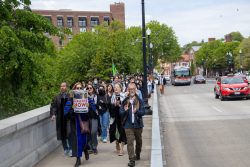President John J. DeGioia recieved a letter from the US Department of Education asking for a written explanation of the University’s non-disclosure policy. The letter comes after Kate Dieringer (NHS ‘05), along with the advocacy group Security on Campus, Inc., filed a complaint with the Department earlier this year.
In the letter the Department stated its intent to investigate Dieringer’s complaint.
The letter gives the University 15 days to “fully address and describe [these] items both as a matter of general policy and as applied in the case of Ms. Dieringer.”
According to Security on Campus, Inc., if the University is found in violation of the law, it could face $27,500 fines and possibly lose eligibility to participate in federal student aid programs.
Dieringer and student groups who have tried to change the University’s policy view this letter as a victory.
“I’m elated that this issue has been pushed forward in such a public way,” Amy Hsueh (CAS ‘03), a representative of AFIRMS, a student group working to reform the university’s sexual assault policy, said.
The Office of Communications was contacted but did not reply by press time.
In April 2002, Dieringer reported to the Office of Student Conduct that she had been sexually assaulted in fall 2001. In order to learn the results of her assailant’s adjudication process, Dieringer was required to sign a non-disclosure agreement, by which she was not allowed to reveal any personal details about her assailant.
Dieringer argues that this agreement violates the Clery Act, which states that victims of sexual assault are unconditionally entitled to know the outcome of any adjudication process.
The Department’s letter specifically cites the Clery Act. It notes that while the it is an exception to the Family Educational Rights and Privacy statute, the statute itself does not restrict disclosure in cases such as Dieringer’s. FERPA was intended to protect student privacy.
In addition the letter acknowledges the importance of disclosure to the victim’s healing process, noting that “the United States Congress carved out these exceptions precisely so that victims could use such information in their recovery process and for other purposes.”
However, the letter stipulates that the agency is “only in the early stages of evaluating the claims by the complainants.” The Department of Education will hear the University’s response to these allegations.
“I hope that they admit that what they were doing was wrong. I hope they take responsibility for the pain that they have caused me and so many others,” Dieringer said.
Hsueh called on the University to “respond with the utmost urgency” and “take this opportunity to reflect on the damage this has done.”
For Dieringer, this marks the end of a long battle with the University administration. “It’s a culmination of everything I’ve been working for to get the administration to abolish disclosure agreements,” she said.
“Before it was just me versus the administration. This legal action is what it took.”




